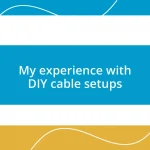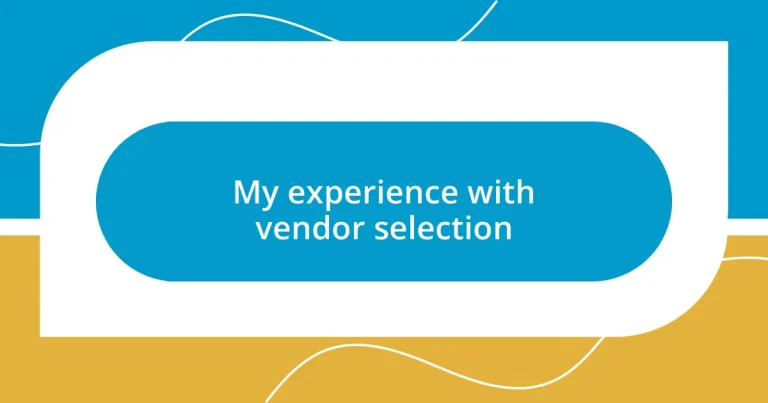Key takeaways:
- Defining clear needs and conducting thorough research is crucial for an effective vendor selection process.
- Key selection criteria should align with company values, assess financial stability, and prioritize customer service.
- Involving the team in decision-making fosters collaboration and confidence, while focusing on relationship-building enhances vendor partnerships.
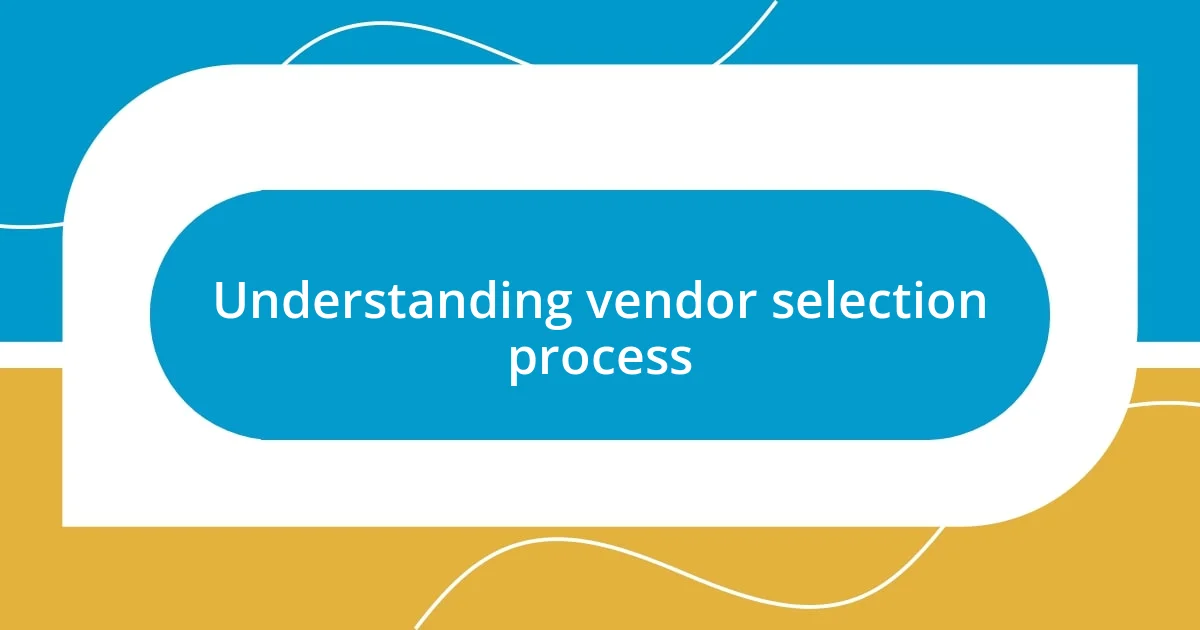
Understanding vendor selection process
Understanding the vendor selection process is crucial for any business that aims to partner with the right suppliers. I remember when I first got involved in this process; it felt overwhelming. How do you choose a vendor when so many options seem to tick the boxes?
In my experience, the first step is to define your needs clearly. I once skipped this crucial step, thinking I could figure it out as I went along. Let’s just say it led to a lot of frustration! Ensuring that you have a detailed list of requirements helps you evaluate vendors more effectively. Have you ever imagined how much smoother a selection process could be if everyone were on the same page from the start? Trust me, it’s worth the effort.
Next, consider the importance of conducting thorough research. I used to rely solely on online reviews, but I learned that nothing beats speaking directly to past clients. It’s all about the stories behind the numbers, right? This insight can reveal potential red flags that a spreadsheet just wouldn’t show. Engaging with vendors on a personal level often gives a clearer picture of their reliability and compatibility with your business goals.
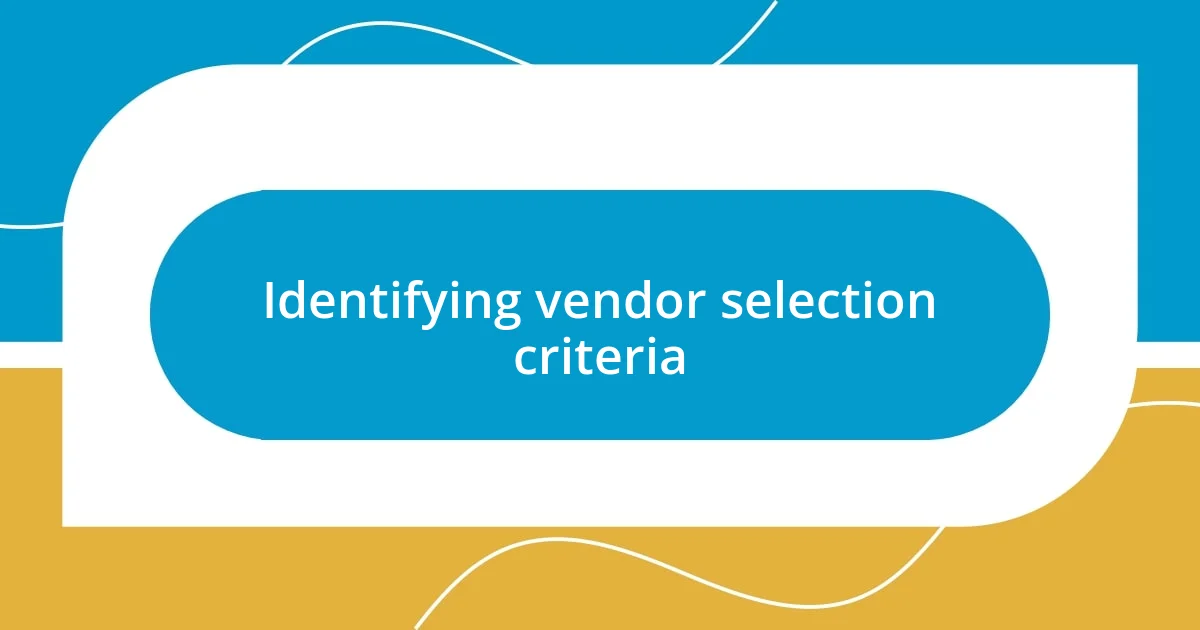
Identifying vendor selection criteria
Identifying vendor selection criteria is more than just checking boxes; it’s about what truly matters to your business. During one of my projects, I realized that aligning criteria with our company values was essential. For instance, we needed a vendor who not only provided quality but also prioritized sustainability. It sparked a meaningful discussion among our team, transforming the selection into a shared mission rather than just a task.
Another key factor is assessing the vendor’s financial stability. I had an experience where we chose a vendor based purely on their innovative offerings, neglecting to investigate their financial health thoroughly. A few months in, we faced challenges as they struggled to keep up with demand, which ultimately disrupted our supply chain. I learned that understanding their stability can prevent unforeseen risks and ensure a smoother partnership.
Lastly, evaluating customer service capabilities cannot be overlooked. Once, I worked with a vendor who had perfect product metrics but failed massively in support. It turned out that quick responses and effective communication were critical during our busy seasons. That experience reinforced my belief in prioritizing vendors who offer not just products but also exceptional service, as this can significantly impact your business operations.
| Criteria | Description |
|---|---|
| Alignment with Company Values | Matching vendor philosophy with business principles. |
| Financial Stability | Assessing the vendor’s capability to fulfill long-term commitments. |
| Customer Service | Evaluating responsiveness and support quality throughout the partnership. |
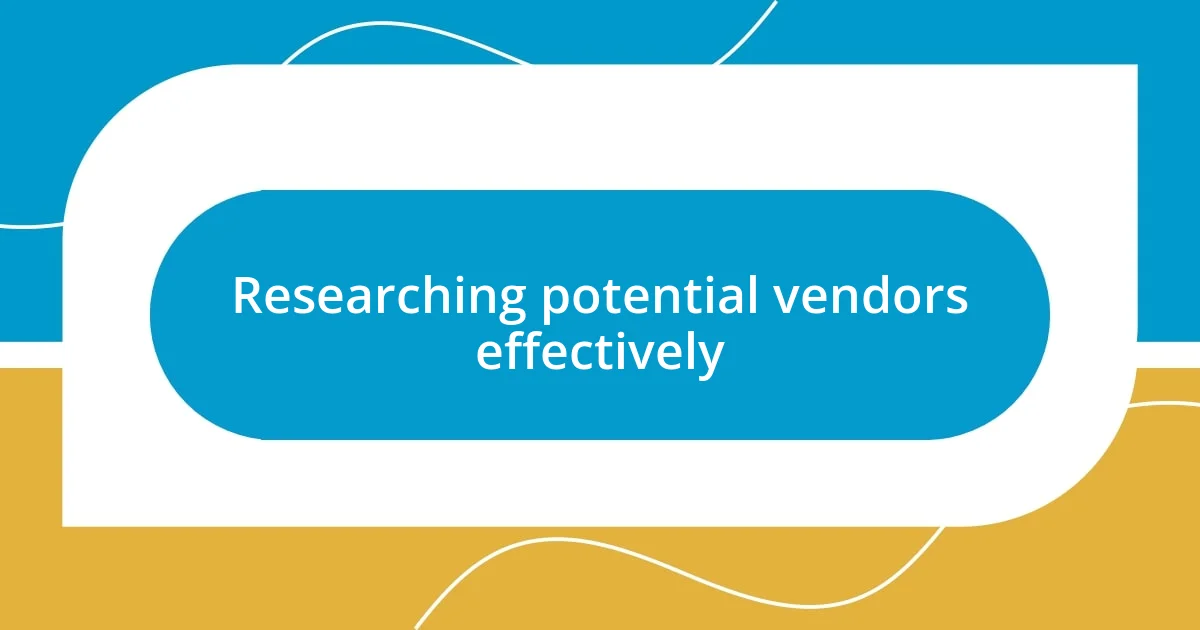
Researching potential vendors effectively
When I embarked on researching potential vendors, I quickly discovered the value of diversifying my sources. Initially, I was hesitant to stray too far from the confines of online platforms. However, a pivotal moment came when I attended a trade show and had direct conversations with various vendors. The real-time feedback I gathered was invaluable and helped me assess their credibility beyond what any review could convey. To maximize your research efforts, consider the following methods:
- Engage in direct interviews with past clients to gain insights into their experiences.
- Attend industry events and trade shows to interact with vendors personally.
- Utilize social media platforms to gather opinions and discussions about potential vendors.
- Check forums and industry groups for unbiased feedback and recommendations.
- Verify references to ensure vendors have a proven track record tailored to your needs.
The emotional connection I formed during those interactions made the process feel more human and less transactional. Further down the line, I learned that taking the time to dive deep into reputation assessments yielded a clear picture of a vendor’s dynamic. It’s tempting to rush this step, but trust me—patience is a virtue in vendor research. Peeling back the layers and digging into financial records and case studies can help illuminate whether a vendor is truly as they present themselves.
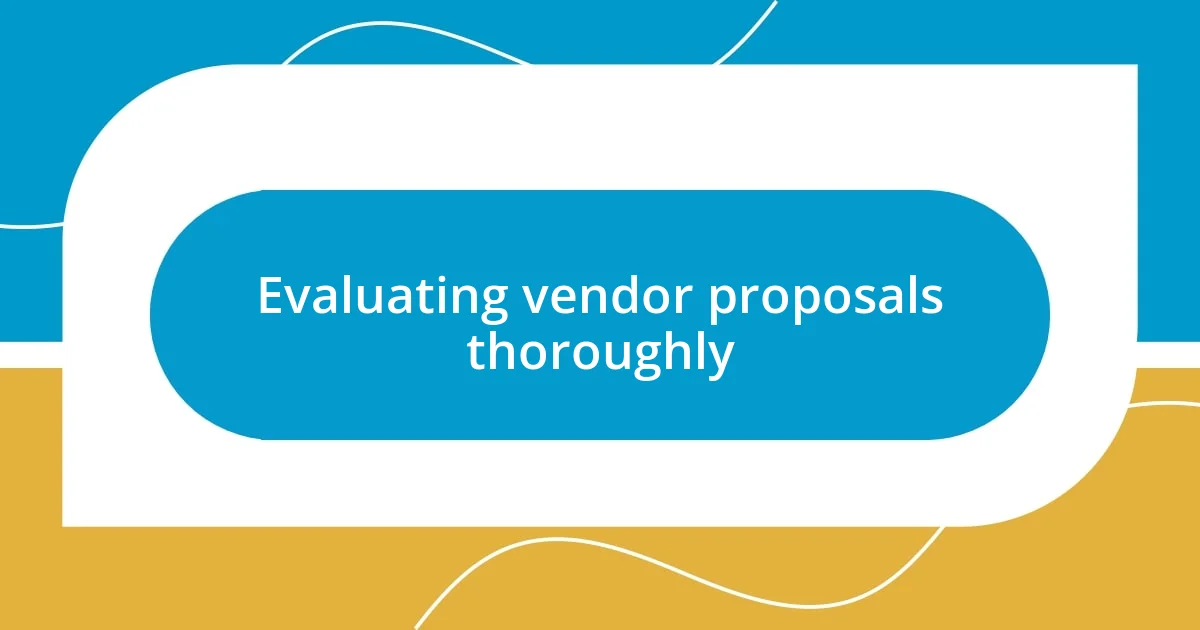
Evaluating vendor proposals thoroughly
When I analyze vendor proposals, I focus on not just the numbers but the story they tell. Once, I received a proposal that looked great on paper but felt soulless. It lacked specificity, leaving me wondering how they would adapt to our unique needs. I’ve learned that a robust proposal should reflect a vendor’s understanding of your industry and your business, making it clear they are not just offering a one-size-fits-all solution.
I also pay close attention to the details in the pricing structure. During one project, I mistakenly overlooked additional fees buried deep in a vendor’s proposal, which led to budget overruns. That taught me the importance of not just focusing on the initial cost, but scrutinizing the entire financial picture to gauge true value. Are there hidden costs, or do they offer transparency? A thorough analysis helps you avoid surprises and builds trust in a potential partnership.
Finally, I often look for evidence of innovation and adaptability in proposals. I once partnered with a vendor who had a standard approach, which stifled our potential for growth. A vendor who demonstrates a willingness to evolve and suggests creative solutions can make all the difference in a competitive market. When proposals are full of ideas and forward-thinking strategies, it excites me about the possibilities of collaboration. Wouldn’t you want to work with someone who thinks ahead and aligns with your vision?
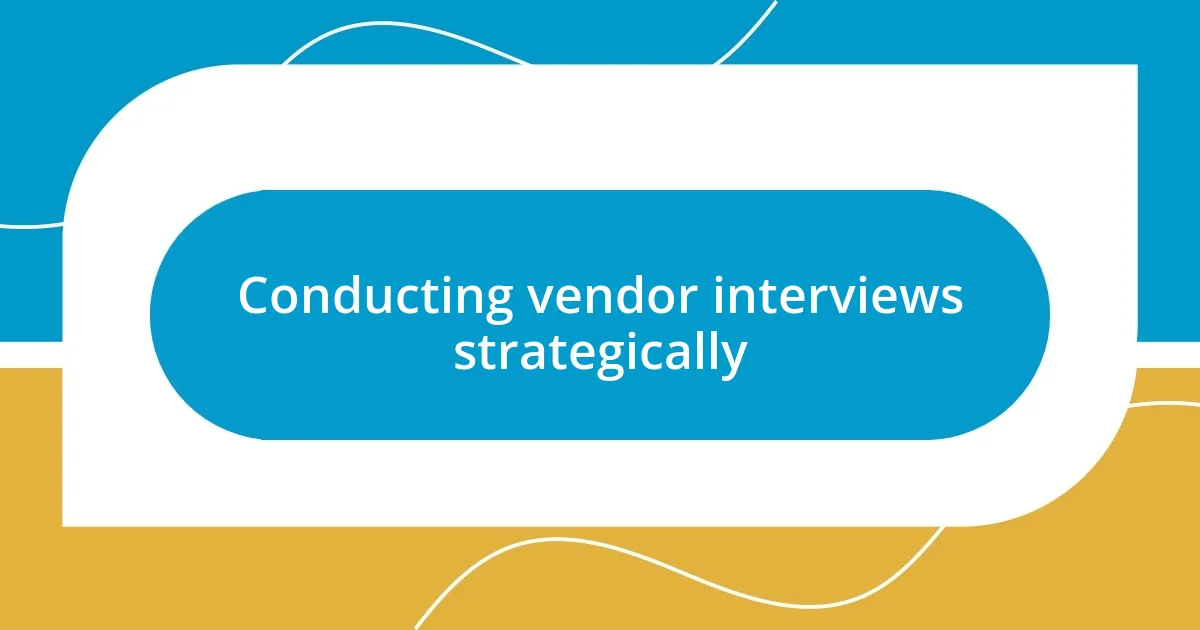
Conducting vendor interviews strategically
When conducting vendor interviews, I’ve found that preparation is essential. Setting clear objectives for what I want to learn can make the difference between an engaging conversation and a wasted opportunity. For instance, I’ve gone into interviews with specific questions that guided the discussion, allowing me to uncover details that may not have surfaced otherwise. It’s like having a roadmap; without it, you’re prone to get lost in the conversation.
One technique that has served me well is to create a relaxed atmosphere during the interview. I remember one vendor who seemed nervous until I shared a bit about my own company’s journey. Their demeanor shifted instantly; they opened up, revealing insights about their experiences and how they adapted to various challenges. This created a genuine dialogue that helped me assess not only their technical capabilities but also their cultural fit with my business. Do you ever wonder how a simple change in tone can lead to more meaningful insights?
Additionally, I prioritize asking open-ended questions, which often yield more profound answers. Instead of just “What are your services?” I ask, “Can you share an example of how you’ve tailored your services to meet a client’s unique needs?” This approach not only invites storytelling but also shows me how they think on their feet. I recall a vendor who shared a project that seemed almost like a case study in creativity; it made me enthusiastic about potential collaboration. Isn’t it fascinating to see how much depth can emerge from a well-structured conversation?
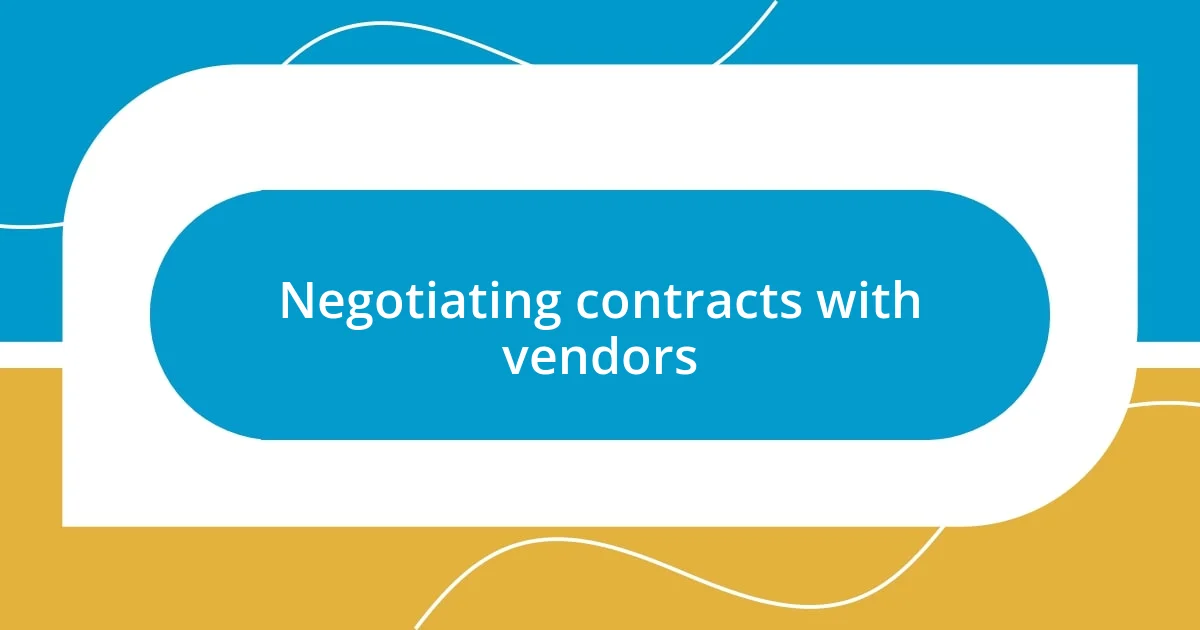
Negotiating contracts with vendors
Negotiating contracts with vendors can feel a bit like a dance—each party has to find their rhythm. I remember one negotiation where I found it essential to establish a win-win scenario right from the start. By openly discussing our goals and what we both wanted to achieve, it created a more relaxed atmosphere where ideas could flow freely. Isn’t it amazing how clarity can transform the energy in the room?
As negotiations progressed, I paid close attention to the fine print, especially around terms and conditions. In a previous engagement, I encountered a vendor whose contract had ambiguous language surrounding deliverables. I raised my concerns, and this led to a fruitful discussion that not only clarified expectations but also strengthened our relationship. It made me realize that being proactive can help avoid future misunderstandings and save a lot of headaches down the line.
What I’ve learned is the art of compromise. Just the other day, I was negotiating with a vendor on pricing. They were firm on their offer, but I articulated additional value I could offer in return, like potential referrals. This conversation sparked an idea in them, leading to a more favorable solution for both sides. It’s moments like these that remind me that negotiation is not just about winning but about forging partnerships based on mutual respect and understanding. How often do we consider the importance of creating synergy in our negotiations?
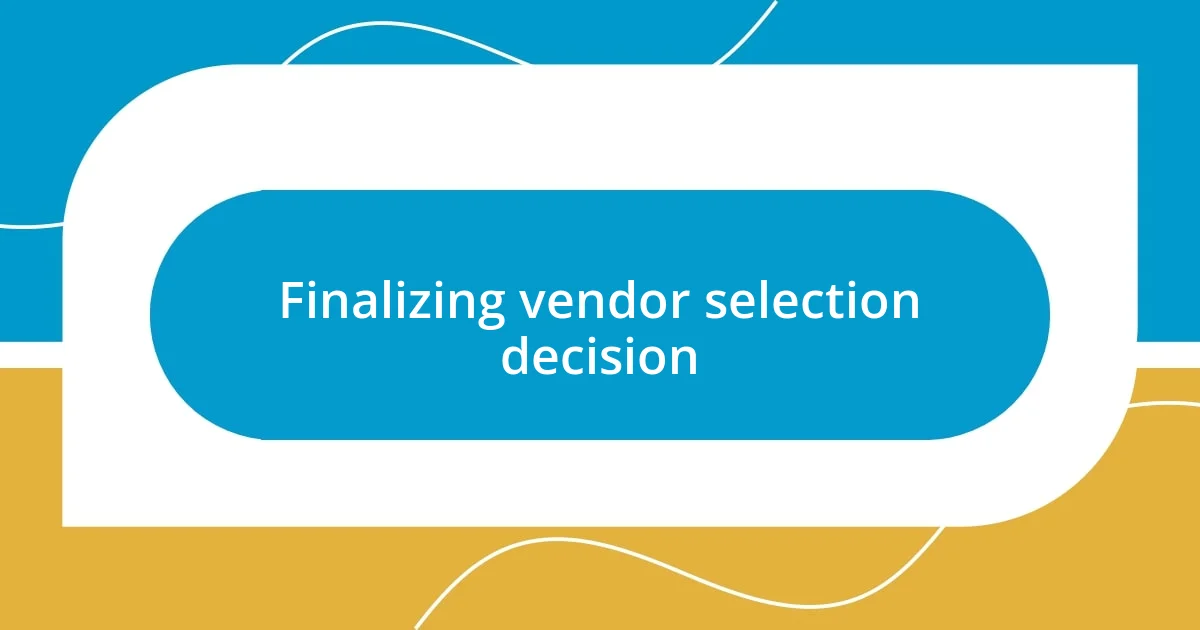
Finalizing vendor selection decision
After gathering all the necessary information and conducting interviews, the next step I find crucial is narrowing down my choices. I remember once sitting down with a pros-and-cons list, which transformed my decision-making process into something tangible. It allowed me to visualize potential vendors and how they stacked up against each other. Has anyone else experienced that “aha” moment when a simple list clarifies things dramatically?
Once I identify my top candidates, I like to involve my team in the final decision. I recall a time when I hesitated between two vendors, both of whom had impressive proposals. By inviting my colleagues to weigh in with their perspectives, we collectively discussed what worked and didn’t work within each proposal. This collaborative approach not only enriched my understanding but also fostered a sense of ownership within the team. Does involving others in your decision-making help you feel more confident in your choice?
Ultimately, I always remind myself that selecting a vendor is about more than just numbers; it’s about the relationship I’m about to build. I vividly remember deciding on a vendor with a passion for their work, which was evident in their proposal. That level of enthusiasm resonated with me and made the decision feel right, even if others might have chosen differently. Isn’t it interesting how our instincts play a role alongside logic in such critical choices?
